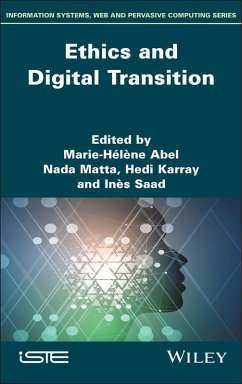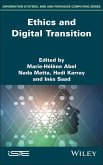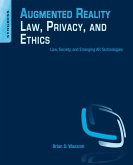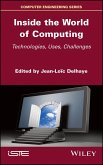Ethics and Digital Transition (eBook, ePUB)
Redaktion: Abel, Marie-Hélène; Saad, Inès; Karray, Hedi; Matta, Nada
142,99 €
142,99 €
inkl. MwSt.
Sofort per Download lieferbar

0 °P sammeln
142,99 €
Als Download kaufen

142,99 €
inkl. MwSt.
Sofort per Download lieferbar

0 °P sammeln
Jetzt verschenken
Alle Infos zum eBook verschenken
142,99 €
inkl. MwSt.
Sofort per Download lieferbar
Alle Infos zum eBook verschenken

0 °P sammeln
Ethics and Digital Transition (eBook, ePUB)
Redaktion: Abel, Marie-Hélène; Saad, Inès; Karray, Hedi; Matta, Nada
- Format: ePub
- Merkliste
- Auf die Merkliste
- Bewerten Bewerten
- Teilen
- Produkt teilen
- Produkterinnerung
- Produkterinnerung

Bitte loggen Sie sich zunächst in Ihr Kundenkonto ein oder registrieren Sie sich bei
bücher.de, um das eBook-Abo tolino select nutzen zu können.
Hier können Sie sich einloggen
Hier können Sie sich einloggen
Sie sind bereits eingeloggt. Klicken Sie auf 2. tolino select Abo, um fortzufahren.

Bitte loggen Sie sich zunächst in Ihr Kundenkonto ein oder registrieren Sie sich bei bücher.de, um das eBook-Abo tolino select nutzen zu können.
This book presents a study carried out by the IEEE-SMC French chapter on ethics and digital transformation in industry and society. Based on a survey of researchers in ICT, artificial intelligence (AI), as well as on presentation seminars, this study examines the various aspects that should be considered when assessing ethical principles in approaches to digital transition, particularly with regard to intelligent systems. Considering this, Ethics and Digital Transition presents the main technologies and uses of intelligent systems. Bringing together specialists from various fields, it explores…mehr
- Geräte: eReader
- mit Kopierschutz
- eBook Hilfe
- Größe: 3.76MB
Andere Kunden interessierten sich auch für
![Ethics and Digital Transition (eBook, PDF) Ethics and Digital Transition (eBook, PDF)]() Ethics and Digital Transition (eBook, PDF)142,99 €
Ethics and Digital Transition (eBook, PDF)142,99 €![Augmented Reality Law, Privacy, and Ethics (eBook, ePUB) Augmented Reality Law, Privacy, and Ethics (eBook, ePUB)]() Brian WassomAugmented Reality Law, Privacy, and Ethics (eBook, ePUB)28,95 €
Brian WassomAugmented Reality Law, Privacy, and Ethics (eBook, ePUB)28,95 €![Azure Containers Explained (eBook, ePUB) Azure Containers Explained (eBook, ePUB)]() Wesley HaakmanAzure Containers Explained (eBook, ePUB)28,79 €
Wesley HaakmanAzure Containers Explained (eBook, ePUB)28,79 €![Chance, Calculation and Life (eBook, ePUB) Chance, Calculation and Life (eBook, ePUB)]() Chance, Calculation and Life (eBook, ePUB)139,99 €
Chance, Calculation and Life (eBook, ePUB)139,99 €![Inside the World of Computing (eBook, ePUB) Inside the World of Computing (eBook, ePUB)]() Inside the World of Computing (eBook, ePUB)139,99 €
Inside the World of Computing (eBook, ePUB)139,99 €![The Blockchain and the New Architecture of Trust (eBook, ePUB) The Blockchain and the New Architecture of Trust (eBook, ePUB)]() Kevin WerbachThe Blockchain and the New Architecture of Trust (eBook, ePUB)15,95 €
Kevin WerbachThe Blockchain and the New Architecture of Trust (eBook, ePUB)15,95 €![Mastering Windows Server 2022 (eBook, ePUB) Mastering Windows Server 2022 (eBook, ePUB)]() Jordan KrauseMastering Windows Server 2022 (eBook, ePUB)64,79 €
Jordan KrauseMastering Windows Server 2022 (eBook, ePUB)64,79 €-
-
-
This book presents a study carried out by the IEEE-SMC French chapter on ethics and digital transformation in industry and society. Based on a survey of researchers in ICT, artificial intelligence (AI), as well as on presentation seminars, this study examines the various aspects that should be considered when assessing ethical principles in approaches to digital transition, particularly with regard to intelligent systems. Considering this, Ethics and Digital Transition presents the main technologies and uses of intelligent systems. Bringing together specialists from various fields, it explores the different dimensions of ethics that should be considered in the development of these systems, from the engineering sciences to law, sociology and philosophy. It also looks at the future challenges of ethics in the digital transition.
Dieser Download kann aus rechtlichen Gründen nur mit Rechnungsadresse in D ausgeliefert werden.
Produktdetails
- Produktdetails
- Verlag: Wiley-Blackwell
- Seitenzahl: 326
- Erscheinungstermin: 10. April 2025
- Englisch
- ISBN-13: 9781394372393
- Artikelnr.: 73877595
- Verlag: Wiley-Blackwell
- Seitenzahl: 326
- Erscheinungstermin: 10. April 2025
- Englisch
- ISBN-13: 9781394372393
- Artikelnr.: 73877595
- Herstellerkennzeichnung Die Herstellerinformationen sind derzeit nicht verfügbar.
Marie-Hélène Abel is Professor and Head of the Computer Science department at the University of Technology of Compiègne, France. She was President of the IEEE-SMC French chapter from 2014 to 2021. Nada Matta is Professor of Knowledge Engineering and Management at the Université de Technologie de Troyes, France. She was Co-Chair of the IEEE-SMC French chapter from 2022 to 2024. Hedi Karray is Programme Manager for Artificial Intelligence at the European Innovation Council, and a former professor at the University of Technology Tarbes Occitanie Pyrénées, France. He was Co-Chair of the IEEE-SMC French chapter from 2022 to 2024. Inès Saad is Professor of Information Systems at Amiens Business School and a researcher at the UPJV's MIS laboratory, France. She is also the Chair of the ICIKS conference and the IEEE-SMC French chapter.
Foreword xi
Jean-Gabriel GANASCIA
Introduction xv
Nada MATTA, Marie-Hélène ABEL, Hedi KARRAY and Inès SAAD
Chapter 1 Digital Ethics: Empowering Agents and Taking Care of Systems 1
Bruno BACHIMONT
1.1 Introduction 1
1.2 Technology and ethical neutrality 3
1.3 What are the ethics of technology? 5
1.3.1 Contemporary ethics 5
1.3.2 The ethics of moral agents 7
1.4 Calculation, algorithm 10
1.5 The ethical challenges of digital technology 14
1.5.1 Complexity and technology: temporal alienation 14
1.5.2 Data, algorithms: alienation of property 16
1.5.3 Moral agents and their acolytes 18
1.5.4 Ethical situations 19
1.5.5 Empowering agents 20
1.5.6 Taking care of patients 22
1.5.7 Taking care of witnesses 23
1.6 Conclusion 24
1.7 References 25
Chapter 2 Bias, Discrimination and Decision-Making: Fate or Responsibility?
29
Florence SÈDES
2.1 Why this question? 29
2.2 Bias, history and typology 31
2.3 Types of bias 35
2.4 Bias and fairness - a measure of ethics? 37
2.4.1 A mixed picture 37
2.4.2 How can we define algorithmic fairness? 40
2.4.3 And in practice... how can these biases be corrected? 42
2.4.4 Fairness and interpretability: finding the right balance? 44
2.5 "We are open, the door is just very heavy" 44
2.6 Biases: fatality or responsibility? Fatality and responsibility&... 46
2.6.1 Synthetic data for a qualified bias correction approach 47
2.7 Debiasing machines 48
2.8 References 49
Chapter 3 Digital Technology and Artificial Intelligence: How Can We
Facilitate the Ethical Control of their Use? 51
Alain MILLE
3.1 Introduction 51
3.2 Expected properties of an ethics-oriented DTD-AI 54
3.2.1 Property I: construction and memorization of knowledge of situated
action for the technician (Simondon) as tertiary retentions (Stiegler) 59
3.2.2 Property II: supporting the process of discussing and regulating
activity 61
3.3 Illustrations of DTDs integrating activity reflexivity for individual
and collective documentation purposes 65
3.3.1 Support from M-Traces for a corporate community of practice 66
3.3.2 Support for human learning activity 68
3.3.3 Example of an activity involving a ChatGPT-type DTD-AI 69
3.4 Conclusion 71
3.5 References 76
Chapter 4 Ethical Autonomous Agents: Literature Review and Illustration for
Markov Decision Processes 81
Grégory BONNET, Nadjet BOURDACHE, Abdel-Illah MOUADDIB and Mihail
STOJANOVSKI
4.1 Introduction 81
4.2 Issues specific to the integration of ethics 83
4.2.1 A high-level approach to ethics 83
4.2.2 Programming ethical autonomous agents 85
4.3 Ethical autonomous agents: state of the art 87
4.3.1 Qualitative implicit architectures 87
4.3.2 Qualitative cognitive architectures 88
4.3.3 Quantitative cognitive architectures 93
4.3.4 Learning an ethical model 95
4.3.5 Intermediate conclusion 97
4.4 Ethical Markov decision processes 98
4.4.1 Markov processes and ethical contexts 99
4.4.2 Modeling ethics 102
4.4.3 Solving E-MDPs 105
4.5 Establishing ethical principles in E-MDPs 107
4.5.1 Theory of divine command 107
4.5.2 Prima facie duties 109
4.5.3 Virtue ethics 110
4.6 Conclusion 114
4.7 References 115
Chapter 5 Ethics and Ecology in Production Systems 121
Emmanuel CAILLAUD and Lou GRIMAL
5.1 Introduction 121
5.2 Ecological context 122
5.3 Integrating ethical issues into an industry in ecological transition
126
5.3.1 Attempts to meet standards 128
5.3.2 From environmental ethics to ecological ethics 132
5.3.3 Ecological ethics and technology 133
5.4 Proposed areas of work 134
5.4.1 Competence of production system players 134
5.4.2 Purpose of the production system 135
5.4.3 Returning to planetary limits with available technical systems 136
5.5 Conclusion 137
5.6 Acknowledgments 138
5.7 References 138
Chapter 6 Operational Ethics in Industrial Systems of the Future:
Methodological Elements 141
Damien TRENTESAUX, Lamia BERRAH and Karine SAMUEL
6.1 Introduction 141
6.2 Ethics: definition, typologies and paradigms 144
6.3 Performance management for 4.0 industrial systems and its ethical risks
147
6.3.1 Overview 147
6.3.2 State of the art on ethics in industrial systems of the future 149
6.4 Toward the operational integration of ethics in the 4.0 industrial
systems 153
6.4.1 Scope 154
6.4.2 Methodological elements 154
6.5 Industrial testimony 159
6.6 Conclusion 164
6.7 Acknowledgements 165
6.8 References 165
Chapter 7 AI for Industry: Transforming the Daily Lives of Maintenance
Operators 171
Anne DOURGNON, Eunika MERCIER LAURENT and Alain ANTOINE
7.1 Genesis of this innovation 171
7.2 Background of this innovation 173
7.2.1 A low-key innovation 173
7.3 The naysayers 174
7.4 Dealing with hazards 176
7.5 A decisive demonstration 177
7.6 The keys to success 178
7.7 Overcoming obstacles 179
7.8 Outlook 180
7.9 Acknowledgments 181
7.10 References 181
Conclusion 183
Hedi KARRAY
C.1 From ethics to responsibility 183
C.2 Principles and challenges behind responsible AI 184
C.3 Responsible AI: a threat or an opportunity? 186
C.4 Responsible AI challenges 187
C.5 An ecosystem for responsible AI 189
C.5.1 Actions for responsible AI 190
C.5.2 Policy measures: initiatives and regulations 191
C.5.3 Technical progress 191
C.5.4 Public awareness and education 192
C.6 References 192
List of Authors 195
Index 197
Jean-Gabriel GANASCIA
Introduction xv
Nada MATTA, Marie-Hélène ABEL, Hedi KARRAY and Inès SAAD
Chapter 1 Digital Ethics: Empowering Agents and Taking Care of Systems 1
Bruno BACHIMONT
1.1 Introduction 1
1.2 Technology and ethical neutrality 3
1.3 What are the ethics of technology? 5
1.3.1 Contemporary ethics 5
1.3.2 The ethics of moral agents 7
1.4 Calculation, algorithm 10
1.5 The ethical challenges of digital technology 14
1.5.1 Complexity and technology: temporal alienation 14
1.5.2 Data, algorithms: alienation of property 16
1.5.3 Moral agents and their acolytes 18
1.5.4 Ethical situations 19
1.5.5 Empowering agents 20
1.5.6 Taking care of patients 22
1.5.7 Taking care of witnesses 23
1.6 Conclusion 24
1.7 References 25
Chapter 2 Bias, Discrimination and Decision-Making: Fate or Responsibility?
29
Florence SÈDES
2.1 Why this question? 29
2.2 Bias, history and typology 31
2.3 Types of bias 35
2.4 Bias and fairness - a measure of ethics? 37
2.4.1 A mixed picture 37
2.4.2 How can we define algorithmic fairness? 40
2.4.3 And in practice... how can these biases be corrected? 42
2.4.4 Fairness and interpretability: finding the right balance? 44
2.5 "We are open, the door is just very heavy" 44
2.6 Biases: fatality or responsibility? Fatality and responsibility&... 46
2.6.1 Synthetic data for a qualified bias correction approach 47
2.7 Debiasing machines 48
2.8 References 49
Chapter 3 Digital Technology and Artificial Intelligence: How Can We
Facilitate the Ethical Control of their Use? 51
Alain MILLE
3.1 Introduction 51
3.2 Expected properties of an ethics-oriented DTD-AI 54
3.2.1 Property I: construction and memorization of knowledge of situated
action for the technician (Simondon) as tertiary retentions (Stiegler) 59
3.2.2 Property II: supporting the process of discussing and regulating
activity 61
3.3 Illustrations of DTDs integrating activity reflexivity for individual
and collective documentation purposes 65
3.3.1 Support from M-Traces for a corporate community of practice 66
3.3.2 Support for human learning activity 68
3.3.3 Example of an activity involving a ChatGPT-type DTD-AI 69
3.4 Conclusion 71
3.5 References 76
Chapter 4 Ethical Autonomous Agents: Literature Review and Illustration for
Markov Decision Processes 81
Grégory BONNET, Nadjet BOURDACHE, Abdel-Illah MOUADDIB and Mihail
STOJANOVSKI
4.1 Introduction 81
4.2 Issues specific to the integration of ethics 83
4.2.1 A high-level approach to ethics 83
4.2.2 Programming ethical autonomous agents 85
4.3 Ethical autonomous agents: state of the art 87
4.3.1 Qualitative implicit architectures 87
4.3.2 Qualitative cognitive architectures 88
4.3.3 Quantitative cognitive architectures 93
4.3.4 Learning an ethical model 95
4.3.5 Intermediate conclusion 97
4.4 Ethical Markov decision processes 98
4.4.1 Markov processes and ethical contexts 99
4.4.2 Modeling ethics 102
4.4.3 Solving E-MDPs 105
4.5 Establishing ethical principles in E-MDPs 107
4.5.1 Theory of divine command 107
4.5.2 Prima facie duties 109
4.5.3 Virtue ethics 110
4.6 Conclusion 114
4.7 References 115
Chapter 5 Ethics and Ecology in Production Systems 121
Emmanuel CAILLAUD and Lou GRIMAL
5.1 Introduction 121
5.2 Ecological context 122
5.3 Integrating ethical issues into an industry in ecological transition
126
5.3.1 Attempts to meet standards 128
5.3.2 From environmental ethics to ecological ethics 132
5.3.3 Ecological ethics and technology 133
5.4 Proposed areas of work 134
5.4.1 Competence of production system players 134
5.4.2 Purpose of the production system 135
5.4.3 Returning to planetary limits with available technical systems 136
5.5 Conclusion 137
5.6 Acknowledgments 138
5.7 References 138
Chapter 6 Operational Ethics in Industrial Systems of the Future:
Methodological Elements 141
Damien TRENTESAUX, Lamia BERRAH and Karine SAMUEL
6.1 Introduction 141
6.2 Ethics: definition, typologies and paradigms 144
6.3 Performance management for 4.0 industrial systems and its ethical risks
147
6.3.1 Overview 147
6.3.2 State of the art on ethics in industrial systems of the future 149
6.4 Toward the operational integration of ethics in the 4.0 industrial
systems 153
6.4.1 Scope 154
6.4.2 Methodological elements 154
6.5 Industrial testimony 159
6.6 Conclusion 164
6.7 Acknowledgements 165
6.8 References 165
Chapter 7 AI for Industry: Transforming the Daily Lives of Maintenance
Operators 171
Anne DOURGNON, Eunika MERCIER LAURENT and Alain ANTOINE
7.1 Genesis of this innovation 171
7.2 Background of this innovation 173
7.2.1 A low-key innovation 173
7.3 The naysayers 174
7.4 Dealing with hazards 176
7.5 A decisive demonstration 177
7.6 The keys to success 178
7.7 Overcoming obstacles 179
7.8 Outlook 180
7.9 Acknowledgments 181
7.10 References 181
Conclusion 183
Hedi KARRAY
C.1 From ethics to responsibility 183
C.2 Principles and challenges behind responsible AI 184
C.3 Responsible AI: a threat or an opportunity? 186
C.4 Responsible AI challenges 187
C.5 An ecosystem for responsible AI 189
C.5.1 Actions for responsible AI 190
C.5.2 Policy measures: initiatives and regulations 191
C.5.3 Technical progress 191
C.5.4 Public awareness and education 192
C.6 References 192
List of Authors 195
Index 197
Foreword xi
Jean-Gabriel GANASCIA
Introduction xv
Nada MATTA, Marie-Hélène ABEL, Hedi KARRAY and Inès SAAD
Chapter 1 Digital Ethics: Empowering Agents and Taking Care of Systems 1
Bruno BACHIMONT
1.1 Introduction 1
1.2 Technology and ethical neutrality 3
1.3 What are the ethics of technology? 5
1.3.1 Contemporary ethics 5
1.3.2 The ethics of moral agents 7
1.4 Calculation, algorithm 10
1.5 The ethical challenges of digital technology 14
1.5.1 Complexity and technology: temporal alienation 14
1.5.2 Data, algorithms: alienation of property 16
1.5.3 Moral agents and their acolytes 18
1.5.4 Ethical situations 19
1.5.5 Empowering agents 20
1.5.6 Taking care of patients 22
1.5.7 Taking care of witnesses 23
1.6 Conclusion 24
1.7 References 25
Chapter 2 Bias, Discrimination and Decision-Making: Fate or Responsibility?
29
Florence SÈDES
2.1 Why this question? 29
2.2 Bias, history and typology 31
2.3 Types of bias 35
2.4 Bias and fairness - a measure of ethics? 37
2.4.1 A mixed picture 37
2.4.2 How can we define algorithmic fairness? 40
2.4.3 And in practice... how can these biases be corrected? 42
2.4.4 Fairness and interpretability: finding the right balance? 44
2.5 "We are open, the door is just very heavy" 44
2.6 Biases: fatality or responsibility? Fatality and responsibility&... 46
2.6.1 Synthetic data for a qualified bias correction approach 47
2.7 Debiasing machines 48
2.8 References 49
Chapter 3 Digital Technology and Artificial Intelligence: How Can We
Facilitate the Ethical Control of their Use? 51
Alain MILLE
3.1 Introduction 51
3.2 Expected properties of an ethics-oriented DTD-AI 54
3.2.1 Property I: construction and memorization of knowledge of situated
action for the technician (Simondon) as tertiary retentions (Stiegler) 59
3.2.2 Property II: supporting the process of discussing and regulating
activity 61
3.3 Illustrations of DTDs integrating activity reflexivity for individual
and collective documentation purposes 65
3.3.1 Support from M-Traces for a corporate community of practice 66
3.3.2 Support for human learning activity 68
3.3.3 Example of an activity involving a ChatGPT-type DTD-AI 69
3.4 Conclusion 71
3.5 References 76
Chapter 4 Ethical Autonomous Agents: Literature Review and Illustration for
Markov Decision Processes 81
Grégory BONNET, Nadjet BOURDACHE, Abdel-Illah MOUADDIB and Mihail
STOJANOVSKI
4.1 Introduction 81
4.2 Issues specific to the integration of ethics 83
4.2.1 A high-level approach to ethics 83
4.2.2 Programming ethical autonomous agents 85
4.3 Ethical autonomous agents: state of the art 87
4.3.1 Qualitative implicit architectures 87
4.3.2 Qualitative cognitive architectures 88
4.3.3 Quantitative cognitive architectures 93
4.3.4 Learning an ethical model 95
4.3.5 Intermediate conclusion 97
4.4 Ethical Markov decision processes 98
4.4.1 Markov processes and ethical contexts 99
4.4.2 Modeling ethics 102
4.4.3 Solving E-MDPs 105
4.5 Establishing ethical principles in E-MDPs 107
4.5.1 Theory of divine command 107
4.5.2 Prima facie duties 109
4.5.3 Virtue ethics 110
4.6 Conclusion 114
4.7 References 115
Chapter 5 Ethics and Ecology in Production Systems 121
Emmanuel CAILLAUD and Lou GRIMAL
5.1 Introduction 121
5.2 Ecological context 122
5.3 Integrating ethical issues into an industry in ecological transition
126
5.3.1 Attempts to meet standards 128
5.3.2 From environmental ethics to ecological ethics 132
5.3.3 Ecological ethics and technology 133
5.4 Proposed areas of work 134
5.4.1 Competence of production system players 134
5.4.2 Purpose of the production system 135
5.4.3 Returning to planetary limits with available technical systems 136
5.5 Conclusion 137
5.6 Acknowledgments 138
5.7 References 138
Chapter 6 Operational Ethics in Industrial Systems of the Future:
Methodological Elements 141
Damien TRENTESAUX, Lamia BERRAH and Karine SAMUEL
6.1 Introduction 141
6.2 Ethics: definition, typologies and paradigms 144
6.3 Performance management for 4.0 industrial systems and its ethical risks
147
6.3.1 Overview 147
6.3.2 State of the art on ethics in industrial systems of the future 149
6.4 Toward the operational integration of ethics in the 4.0 industrial
systems 153
6.4.1 Scope 154
6.4.2 Methodological elements 154
6.5 Industrial testimony 159
6.6 Conclusion 164
6.7 Acknowledgements 165
6.8 References 165
Chapter 7 AI for Industry: Transforming the Daily Lives of Maintenance
Operators 171
Anne DOURGNON, Eunika MERCIER LAURENT and Alain ANTOINE
7.1 Genesis of this innovation 171
7.2 Background of this innovation 173
7.2.1 A low-key innovation 173
7.3 The naysayers 174
7.4 Dealing with hazards 176
7.5 A decisive demonstration 177
7.6 The keys to success 178
7.7 Overcoming obstacles 179
7.8 Outlook 180
7.9 Acknowledgments 181
7.10 References 181
Conclusion 183
Hedi KARRAY
C.1 From ethics to responsibility 183
C.2 Principles and challenges behind responsible AI 184
C.3 Responsible AI: a threat or an opportunity? 186
C.4 Responsible AI challenges 187
C.5 An ecosystem for responsible AI 189
C.5.1 Actions for responsible AI 190
C.5.2 Policy measures: initiatives and regulations 191
C.5.3 Technical progress 191
C.5.4 Public awareness and education 192
C.6 References 192
List of Authors 195
Index 197
Jean-Gabriel GANASCIA
Introduction xv
Nada MATTA, Marie-Hélène ABEL, Hedi KARRAY and Inès SAAD
Chapter 1 Digital Ethics: Empowering Agents and Taking Care of Systems 1
Bruno BACHIMONT
1.1 Introduction 1
1.2 Technology and ethical neutrality 3
1.3 What are the ethics of technology? 5
1.3.1 Contemporary ethics 5
1.3.2 The ethics of moral agents 7
1.4 Calculation, algorithm 10
1.5 The ethical challenges of digital technology 14
1.5.1 Complexity and technology: temporal alienation 14
1.5.2 Data, algorithms: alienation of property 16
1.5.3 Moral agents and their acolytes 18
1.5.4 Ethical situations 19
1.5.5 Empowering agents 20
1.5.6 Taking care of patients 22
1.5.7 Taking care of witnesses 23
1.6 Conclusion 24
1.7 References 25
Chapter 2 Bias, Discrimination and Decision-Making: Fate or Responsibility?
29
Florence SÈDES
2.1 Why this question? 29
2.2 Bias, history and typology 31
2.3 Types of bias 35
2.4 Bias and fairness - a measure of ethics? 37
2.4.1 A mixed picture 37
2.4.2 How can we define algorithmic fairness? 40
2.4.3 And in practice... how can these biases be corrected? 42
2.4.4 Fairness and interpretability: finding the right balance? 44
2.5 "We are open, the door is just very heavy" 44
2.6 Biases: fatality or responsibility? Fatality and responsibility&... 46
2.6.1 Synthetic data for a qualified bias correction approach 47
2.7 Debiasing machines 48
2.8 References 49
Chapter 3 Digital Technology and Artificial Intelligence: How Can We
Facilitate the Ethical Control of their Use? 51
Alain MILLE
3.1 Introduction 51
3.2 Expected properties of an ethics-oriented DTD-AI 54
3.2.1 Property I: construction and memorization of knowledge of situated
action for the technician (Simondon) as tertiary retentions (Stiegler) 59
3.2.2 Property II: supporting the process of discussing and regulating
activity 61
3.3 Illustrations of DTDs integrating activity reflexivity for individual
and collective documentation purposes 65
3.3.1 Support from M-Traces for a corporate community of practice 66
3.3.2 Support for human learning activity 68
3.3.3 Example of an activity involving a ChatGPT-type DTD-AI 69
3.4 Conclusion 71
3.5 References 76
Chapter 4 Ethical Autonomous Agents: Literature Review and Illustration for
Markov Decision Processes 81
Grégory BONNET, Nadjet BOURDACHE, Abdel-Illah MOUADDIB and Mihail
STOJANOVSKI
4.1 Introduction 81
4.2 Issues specific to the integration of ethics 83
4.2.1 A high-level approach to ethics 83
4.2.2 Programming ethical autonomous agents 85
4.3 Ethical autonomous agents: state of the art 87
4.3.1 Qualitative implicit architectures 87
4.3.2 Qualitative cognitive architectures 88
4.3.3 Quantitative cognitive architectures 93
4.3.4 Learning an ethical model 95
4.3.5 Intermediate conclusion 97
4.4 Ethical Markov decision processes 98
4.4.1 Markov processes and ethical contexts 99
4.4.2 Modeling ethics 102
4.4.3 Solving E-MDPs 105
4.5 Establishing ethical principles in E-MDPs 107
4.5.1 Theory of divine command 107
4.5.2 Prima facie duties 109
4.5.3 Virtue ethics 110
4.6 Conclusion 114
4.7 References 115
Chapter 5 Ethics and Ecology in Production Systems 121
Emmanuel CAILLAUD and Lou GRIMAL
5.1 Introduction 121
5.2 Ecological context 122
5.3 Integrating ethical issues into an industry in ecological transition
126
5.3.1 Attempts to meet standards 128
5.3.2 From environmental ethics to ecological ethics 132
5.3.3 Ecological ethics and technology 133
5.4 Proposed areas of work 134
5.4.1 Competence of production system players 134
5.4.2 Purpose of the production system 135
5.4.3 Returning to planetary limits with available technical systems 136
5.5 Conclusion 137
5.6 Acknowledgments 138
5.7 References 138
Chapter 6 Operational Ethics in Industrial Systems of the Future:
Methodological Elements 141
Damien TRENTESAUX, Lamia BERRAH and Karine SAMUEL
6.1 Introduction 141
6.2 Ethics: definition, typologies and paradigms 144
6.3 Performance management for 4.0 industrial systems and its ethical risks
147
6.3.1 Overview 147
6.3.2 State of the art on ethics in industrial systems of the future 149
6.4 Toward the operational integration of ethics in the 4.0 industrial
systems 153
6.4.1 Scope 154
6.4.2 Methodological elements 154
6.5 Industrial testimony 159
6.6 Conclusion 164
6.7 Acknowledgements 165
6.8 References 165
Chapter 7 AI for Industry: Transforming the Daily Lives of Maintenance
Operators 171
Anne DOURGNON, Eunika MERCIER LAURENT and Alain ANTOINE
7.1 Genesis of this innovation 171
7.2 Background of this innovation 173
7.2.1 A low-key innovation 173
7.3 The naysayers 174
7.4 Dealing with hazards 176
7.5 A decisive demonstration 177
7.6 The keys to success 178
7.7 Overcoming obstacles 179
7.8 Outlook 180
7.9 Acknowledgments 181
7.10 References 181
Conclusion 183
Hedi KARRAY
C.1 From ethics to responsibility 183
C.2 Principles and challenges behind responsible AI 184
C.3 Responsible AI: a threat or an opportunity? 186
C.4 Responsible AI challenges 187
C.5 An ecosystem for responsible AI 189
C.5.1 Actions for responsible AI 190
C.5.2 Policy measures: initiatives and regulations 191
C.5.3 Technical progress 191
C.5.4 Public awareness and education 192
C.6 References 192
List of Authors 195
Index 197







